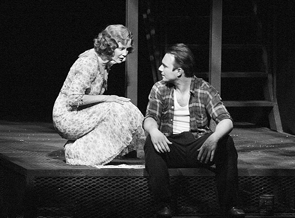Christian Slater holds together “Menagerie” family led by Jessica Lange
It is difficult to break new ground with Tennessee Williams’ classic “The Glass Menagerie.” The specificity of the writing, right down to the stage directions, leave very little leeway for interpretation for the physical life of the show. As a result, the opportunity for theatrical magic comes down to casting. Moreover, this is a gentle play, as the character Tom says in his opening speech, a memory. It evokes a world that is much further away from today’s sensibilities. The prewar, Depression-era St. Louis it conjures is far too distant for all but a small fraction of today’s audiences. As a result, this production seemed dated. The echoes of its time have truly been lost and so what remains is a character study without the immediacy of context.
It is to director David Leveaux’s credit that this production is so compelling. He has focused on the characters and what drives them and he has not shied away from the sentimentality inherent in the conceit of a memory. The story of a family—mother Amanda desperate to find a man for her crippled daughter Laura, fearful that her restless son Tom will abandon them like his father did and the gentleman caller who has the potential to save the day—is astonishingly simple when viewed against the complexities of contemporary structure. And yet the desire to love, be viable and find oneself are human themes that have seldom found better expression than in this script.
Jessica Lange is a convincing Amanda. Fragile, frustrated and very nearly insane, she plays the role as a series of neurotic explosions. It is appropriately unsettling, and she is fearless in attacking the role. Josh Lucas is excellent as The Gentleman Caller. He embodies that kind of aggressive dreamer intoxicated on his own brand of self-confidence and rising on the tide of personality. And yet, in his awkwardness and dream-chasing, he emerges as a kind of loser. It’s a fascinating portrayal. Sarah Paulson is a solid Laura, but she overplays the pathos. It should be simpler, and when she finally does relax and open up a little bit the performance works. The play, however, belongs to Christian Slater. From the flat Midwestern accent to the ability to move fluidly between scenes that are happening and memories, he holds this production together. His restlessness and his stifled poetry motivate the character of Tom, who at the end, cannot find his dream, or his peace.
gaycitynews.com


































